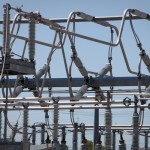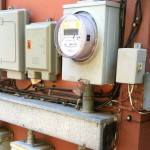Texas PUC Waits for Power Companies that Dare Raise Prices

Dave Fehling/StateImpact Texas
Retail electric providers (REPs) in Texas have to make a decision: should they pass on higher wholesale electricity costs to customers who’ve signed “fixed rate” contracts, contracts that were supposed to lock-in a per kilowatt hour price? If the REPs try it, the Public Utility Commission of Texas (PUC) is just waiting for the first customer to file a complaint.
The suspense begins Wednesday (August 1) when the state-set peak price for wholesale electricity jumps 50 percent to $4,500 per megawatt hour. The PUC approved the hike last month. The peak price can be reached on the hottest days when demand soars. Sky-high peak prices last a matter of hours and come a few dozen days a year. Otherwise, prices for a megawatt hour can be as low about $30. The PUC took the action because it says higher profits will encourage utility companies to build more power plants to keep up with the state’s growth.
‘Much more expensive’
“It’s just the wrong time of the year to do this, if it’s a good idea at any time. But we’re about to hit our peak demand where people need a lot of power to stay safe and cool,” said Tim Morstad, the associate state director of AARP Texas.
Morstad predicts the PUC’s action will make wholesale power “much more expensive” in coming weeks, a cost he expects will be passed on to consumers.
“From what we can tell, the PUC looks they’re going to allow these retail electric providers to raise prices on otherwise fixed contracts. And that’s just not fair for consumers,” Morstad told StateImpact.
How could those retail electric providers break a contract and start charging a new, higher rate? By using a clause found in most REP contracts.
Contract? What Contract?
The contracts, which consumers are supposed to read and understand, can be lengthy, some running eight pages of fine print. Most of the “Terms of Service” as the contracts are called, have a clause that says “your price” can be raised if there’s a “change in law” that imposes higher costs on the REPs.
But does the PUC’s action to raise the cap on the peak wholesale price constitute a change in state law?
Some big customers and even some of the big power companies say it does not. In comments to the PUC, the City of Houston, Oncor Cities (a group representing Dallas and other municipalities in North Texas), as well as power plant operator GDF Suez and retailer Direct Energy all said the hike in peak price was not a “change in law”

Photo by Filipa Rodrigues/StateImpact Texas
Control room of ERCOT, the agency that manages the Texas electric grid
Contending just the opposite are the heavyweights in the Texas power market: NRG and TXU as well as TEAM, the Texas Energy Association for Marketers which represents 13 smaller retailers including Amigo, Bounce and Green Mountain. They told the PUC that the increased costs can be legally passed on to customers even with fixed-price contracts.
After hearing the arguments, the PUC punted: it said it wouldn’t render a decision until a customer filed a formal complaint against a REP or if the PUC’s own staff lodged an enforcement action.
But Will They Dare Do It?
Even if legal, raising rates on customers who thought they had locked in a price could be a public relations disaster. TXU told the PUC such a move would “create a negative public experience.” Both it and Reliant say they don’t “intend to make any changes to prices for customers on fixed price contracts” to quote an email to StateImpact from Patricia Hammond with Reliant’s media relations.
But what about smaller electric retailers? Some consumer advocates predict the smaller REPS will be far more likely to try to raise rates because some operate on such tight margins.
In recent months, the PUC has taken action against REPs for allegedly cutting corners, including the failure to send out monthly bills and to have enough customer service staff to answer the phones. The PUC alleged one REP was over-billing customers by charging state sales tax on electricity. In Texas, there is no state sales tax on residential electricity (Correction: an earlier version of this story left out “state” and “residential” when referring to sales taxes. Cities can tax residential electricity with certain restrictions).
“They’re not the best players out there in the market, a lot of them are companies that are small, provide poor customer service, that have a lot of complaints against them. And its very discouraging because the consumer is not being given a fair shake,” said Carol Biedrzycki, executive director of the Texas Ratepayers’ Organization to Save Energy.
There’s even concern that some smaller retailers will go bankrupt if wholesale prices hit the new higher peak price too many times.
“The most glaring example we have is from 2008 that was caused by a sharp spike in natural gas prices. That affected retailers who were dependent on the spot market,” said Terry Hadley, the PUC’s media liaison.
Hadley said only a few retailers back then went out of business and were “very small”, accounting for only 1 percent of the market according to Hadley.
Emails and calls to several smaller REPs and to industry groups did not result in timely responses for this article.
How Much More on Your Electric Bill?
There’s disagreement over how the higher peak price will show up in consumers’ monthly electric bills. A now oft-quoted cost estimate was submitted independently to the PUC from a group called Texas Industrial Energy Consumers. It put the potential annual additional cost statewide at around $4.7 billion which, if passed on to customers, could amount to hundreds of dollars a year extra on average for each residential customer.
The PUC has neglected to ask for any such cost projections from its own staff or consultants.
At the meeting June 28, during which commissioners approved the price hike, chairman Donna Nelson chastised people who she didn’t name but who she said were mischaracterizing what the new higher peak price could mean to consumers.
“It does not raise rates by 50 percent,” Nelson said.
But she alleged there were “people out there” who are “certainly implying it.”
“And I don’t appreciate that because all it does is send panic through electric customers in Texas,” Nelson said.

